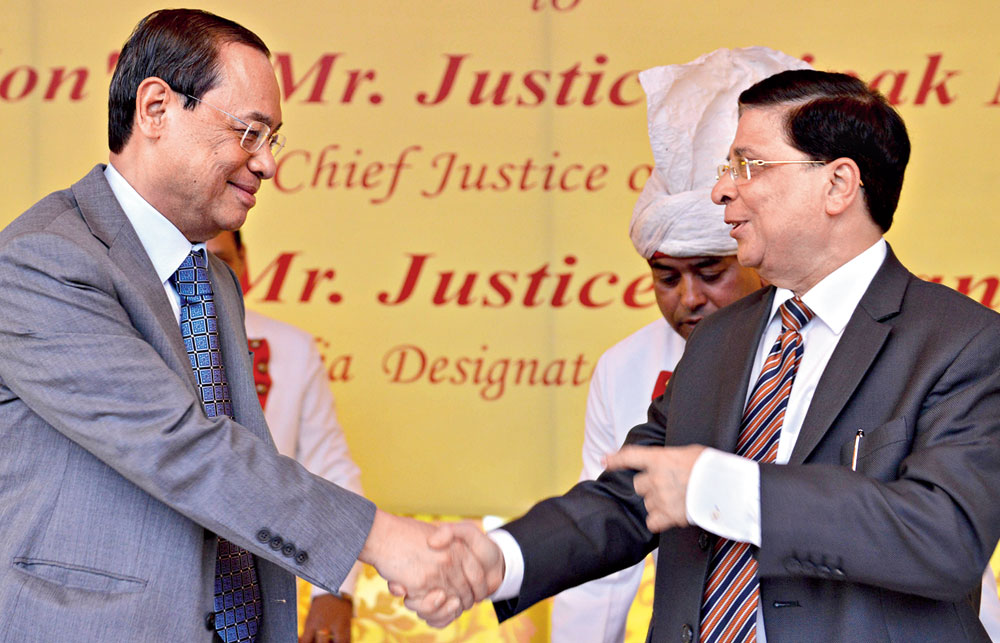Justice Ranjan Gogoi, who will take oath as Chief Justice of India on Wednesday, has defined “true patriotism to the Constitution” as the adherence to “constitutional morality” wherever there is doubt and conflict, instead of “hating”, “despising” and “killing each other” in a society divided on multiple lines, including religion.
The next Chief Justice also referred to “issues that cut and divide us and make us hate and despise those who are different” and spoke of how personal matters like what to “wear, eat, read and drink” were no longer “small and insignificant questions”.
The Constitution must prevail over other factors, not because it is morally superior “but (because) it offers the most reasonable resolution of conflicts over other world views…. Therefore, so long as we fail in our endeavour, we will continue to hate, despise and kill each other,” Justice Gogoi told the farewell programme for outgoing Chief Justice of India Dipak Misra, who demits office on Tuesday.
Justice Gogoi paid eloquent tributes to his predecessor and dwelt extensively on protection of constitutional values for which, he said, both the judiciary and the Bar should be in the “vanguard”.
The effusive praise for Justice Misra after the unprecedented media conference in January — when Justice Gogoi and three other senior-most judges had complained about the way the Chief Justice was allocating sensitive cases — was seen as a gracious gesture upholding the judiciary’s highest standard.
Equally significant was the reassuring message the CJI-designate sent to the polity with his assertion that constitutional morality must be the touchstone at a time hate crimes such as lynching have become a hot-button issue.
Justice Gogoi made it clear he was not merely restating a lofty ideal but was referring to the here and now.
“Let me say a little more. It is perhaps trite to suggest that we live in times of great political churning across the world. Today, alongside the huge diversity of thought and opinion, there co-exist conflicting world views. We are divided perhaps more than ever by lines of caste, class, gender, religion and ideology.
“We are divided into infinitely variegated communities which crisscross along such lines to give us our special identity…. What we should wear? What we should eat? What we should say, read and drink? These are no longer small and insignificant questions about our personal life,” Justice Gogoi said.
He added that even though there might be certain issues which “give identity and purpose to enrich the greatness of our democracy”, there are “issues that cut and divide us and make us hate and despise those who are different”. He did not elaborate.
To look for answers to solve these problems, everybody must look to the Constitution of the country, Justice Gogoi said.
“The challenge is then to construct and protect a common world view that genuinely unifies us as a community. Where do you find such a shared vision? Doubtless in our Constitution and, therefore, argue for creation of community of constitutional values. Belonging to this community does not mean that we must give up who we are. Our personal beliefs and tastes are quite immense that we must constantly evaluate these beliefs on the touchstone of constitutional morality.
“Wherever there is doubt and conflict we must allow constitutional morality to prevail. This is true patriotism to the Constitution.”
Contemporary issues were never far from the speech. “Pro forma constitutional issues can rarely be separated from the politically salient issues of the times. In fact, it is precisely in times like this that the resilience of our commitments are questioned.
“I am taking the liberty of saying our commitments because you and I are already part of this community. Surely we do not think that the Constitution text has regimentalised us but we do believe that it offers the principle and procedures through which we can construct answers suitable to our times,” Justice Gogoi said.
The Indian Constitution is “workable, flexible and strong enough to hold the country together. Both in peace times and war times,” he said, adding that “you and I must be the vanguard in this march and gatekeepers of justice”.
Despite the rancour that marked the January 12 media conference by the four senior-most judges, Justice Gogoi said on Monday that the outgoing CJI had displayed erudition and remarkable fortitude since his elevation to the bench in 1996 by being part of many historic and landmark judgments.
Justice Gogoi said Justice Dipak Misra will be long remembered for several of his judgments like that on Aadhaar, homosexual rights, right to privacy, guidelines to prevent mob lynching, protection of civil liberties and women rights etc.
'Justice Dipak Misra has displayed exemplary courage as a judge. His gracious contribution to the Indian judiciary and jurisprudence on the Constitution was of significance particularly with regard to civil liberties. Generations of academics, judges and advocates will continue to be enriched with his scholarships, long after we are gone.
'It is for this reason I do not say fare well to Chief Justice of India Misra but chose instead to celebrate the vision expressed in his judicial opinions,' Justice Gogoi said amidst thunderous applause.
Recalling Justice Misra's contribution in championing the cause of women, including his award of death penalty for all the convicts in the infamous gangrape case in Delhi, Justice Gogoi said that 'under his able stewardship, not only the Supreme Court manoeuvred difficult legal questions but helped society to think progressively through the Constitution.'
Admitting that there were certain 'inadequacies and aberrations' in the present Indian judiciary, Justice Gogoi said that as CJI-designate, he would assure the country that despite various odds, 'that there is a lot to look ahead. The system has done well in spite of odds, we have a whole lot of committed judges who will continued to be committed.'










